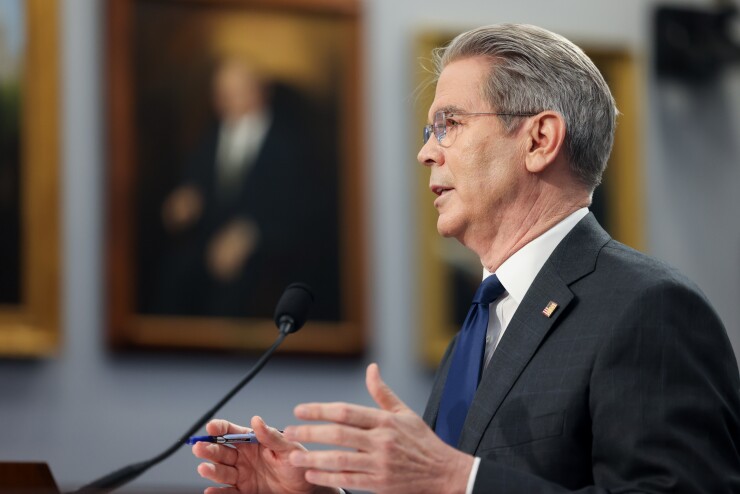
Treasury Secretary Scott Bessent backed acting FDIC Chair Travis Hill before a House committee on Wednesday, calling extended acting tenures not unusual but signaled he's willing to name a permanent chair in the future.
At a House Financial Services Committee hearing, Bessent faced questions from lawmakers on delayed regulatory appointments, capital rules and the future of community finance.
Rep. David Scott, D-Ga., pressed Bessent on why the Federal Deposit Insurance Corp. has been without a Senate-confirmed chair for so long. President Donald Trump tapped Hill as acting chair
"Mr. Hill is a very capable regulator, having been on the board of the FDIC," Bessent said. "I am constantly reviewing the list and thinking who is best to lead that important institution … I think it's very important to get these regulators in place."
The delay in installing a permanent agency head at the nation's deposit insurer follows a trend of prolonged acting appointments in financial regulatory agencies. President Joe Biden picked Michael Hsu as acting comptroller of the currency. Hsu spent an unprecedented three years in the role but was never nominated for the permanent post.
Despite his status as acting chair, Hill is moving forward with Trump's agenda. Last month, Hill said the FDIC is revising rules issued under the Biden administration governing financial submissions large banks must provide to help the agency quickly respond in the event of a bank failure, saying the rule took the "wrong lessons" from a 2023
One of the most important tasks in front of Hill and his fellow regulators is finishing U.S. implementation of the
As an FDIC board member, Hill voted against issuing the proposal, the latest version of which would have significantly changed how regulators calculate banks' capital requirements — raising the amount of non-borrowed money banks must hold alongside borrowed funds to support lending. With Trump's return to the Oval Office, his appointees are tasked with rewriting the rule. Hill and others have emphasized the need for it to be "capital neutral," meaning it should maintain existing capital levels or at least avoid significant increases.
Rep. Andy Barr, R-N.C., made clear on Wednesday that he thinks even the idea of modest increases is too onerous on the financial industry. Barr criticized the prevailing approach as insufficient, noting that capital requirements have risen even since the Fed began discussing capital neutrality in 2019.
In April, Bessent
Bessent agreed with the spirit of Barr's critique, signaling he would take significant industry feedback to inform any re-written endgame proposal.
"I think we want to safely and soundly expand the regulated financial system and get [smaller banks] on equal footing [with nonbanks]," Bessent said Wednesday. "I think that these capital levels that are predictable, are very important for that."
Rep. Al Green, D-Texas, asked Bessent what he would do in light of
Following the order, the Independent Community Bankers of America, American Bankers Association, America's Credit Unions and others
"The CDFI Fund supports the administration's commitment to putting America First by ensuring that all communities — urban and rural, large and small — have access to the capital necessary to participate in and contribute to our national economy," the groups wrote. "The CDFI Fund is a targeted, accountable and impactful program that enables private capital to do more for more Americans."
Trump's 2026 budget proposes eliminating the discretionary awards component of the CDFI Fund, stating that past awards prioritized racial equity, climate resilience and what it called divisive societal framing.
In response to Green, Bessent pointed to a new proposal in the administration's "






